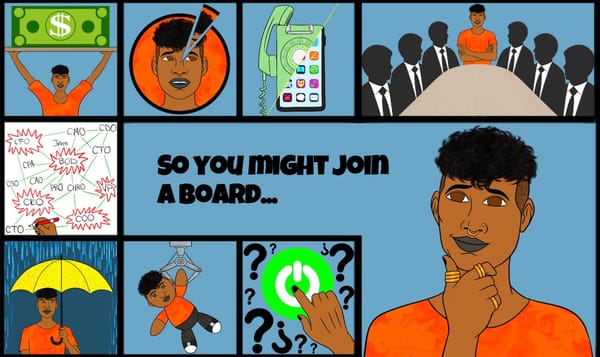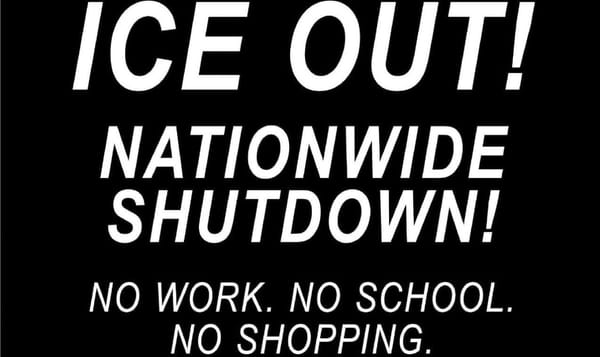President Trump's Executive Order on DEI
What it means for nonprofits, foundations, and the private sector

I wrote up a post for my friend Maleah Jackson, the Principal and Managing Consultant of Makari Consulting, to share with her clients. She was kind enough to let me cross-post it here. No matter where you work, our fascist white supremacist government is threatening the ways you work. Read on to learn more about this one specific executive order in what feels like an avalanche of them.
Since Inauguration Day, President Trump has issued a flurry of Executive Orders (EO). These haven't all been proclamations like renaming the Gulf of Mexico. Trump's orders attack efforts to improve diversity, equity, and inclusion (DEI) across the country. We know these policies and programs are essential—while they may be at risk, we are not powerless.
Last week, the Council on Foundations and others hosted an online seminar to share what we know about the EO known as Ending Illegal Discrimination and Restoring Merit-Based Opportunity. They invited Emily Cuneo DeSmedt of Morgan Lewis to explain it to participants. DeSmedt is a litigator who handles employment issues, DEI, and discrimination cases. She also told us about two other EOs that were not the subject of this webinar.
The first bans DEI programs and terminates DEI employees working in the federal government. The second states that the federal government will recognize only two sexes. These orders, while important, were not the subject of this call.
DeSmedt shared her thoughts on this EO, addressed potential consequences, and gave recommendations on how to reduce risk. Here's what we learned.
What the Executive Order says
First, it cancels several executive orders, including one that dates to 1965. It also issues directives to federal agencies, contractors, and subcontractors.
Federal contractors and subcontractors must:
- End all DEI and DEIA-related "mandates, requirements, programs, or activities"
- End all acts of "affirmative action"
- Not consider protected classes (race, color, sex, sexual preference, religion, or national origin) when making hiring decisions
- Certify that their DEI programs, if any, do not violate anti-discrimination laws
The heads of every federal agency must:
- Stop promoting "diversity"
- Remove all references to DEI and DEIA across the agency
- Work with the Attorney General and the Office of Management and Budget to create a report within 120 days
The report has the biggest potential for impact on the private sector. The report must:
- Identify organizations that operate "discriminatory" DEI practices
- Name key sectors or industries of concern within each agency's authority
- Name the most “egregious discriminatory DEI practitioners” in each sector
- Identify strategies to encourage the private sector to end “illegal DEI discrimination”
- Identify potential opportunities to litigate or take regulatory action against companies with such policies
- Identify 9 companies, per agency, that could face potential civil compliance investigations
Investigations or even civil action could occur against the following entities:
- Large nonprofit corporations or associations
- Foundations with over $500M in assets
- State and local bar and medical associations
- Institutions of higher education with endowments over $1B
The executive order applies to any federal agency that handles anti-discrimination laws. DeSmedt notes that the Equal Employment Opportunity Commission (EEOC) is the most obvious agency. For example, any organization that employs people could be at risk for review. But many agencies have non-discrimination laws within their purview. Examples include the Equal Credit Opportunity Act, the Affordable Care Act, or the Fair Housing Act. Any organization whose work touches one of these laws could be at risk of investigation.
Changes and potential consequences
What does this Executive Order change? DeSmedt notes that the EO doesn't change any laws. It only expands on what has already been happening. In 2023, an anti-DEI group filed suit against the Fearless Fund, a private venture capital fund. Fearless Fund ran a contest to fund businesses owned by at least one woman of color. This group claimed Fearless Fund violated Section 1981 of the Civil Rights Act. Fearless Fund ultimately settled out of court and canceled the grant contest.
What might happen if the government launches a civil compliance investigation? One example DeSmedt gave was if the EEOC charged a company with violating Title VII of the Civil Rights Act. That company would then be subject to investigation. The investigation could request all communications about your practices, programs, policies, and data. Once reviewed, they could file a lawsuit against that company.
What you can do
DeSmedt offered recommendations that organizations can take to limit their risk. This isn't legal advice, of course, and you should bring your questions and plans to a lawyer you trust.
Don't panic. The Executive Order by design wants us to panic," DeSmedt said. "They want to influence our behavior before any investigation launches." We can't predict what will happen with this or other EOs, but we can prepare ourselves.
Read the Executive Order. These aren't as lengthy or complex as legislation tends to be. Reading the text and understanding it will go a long way to defending against it.
Review your communications, documents, and practices. What would happen if you turned them over in an investigation? What if you had to defend them in litigation? In the past, anyone with an agenda to restrict DEI could review public information. Think websites, mission statements, and similar materials. Under this EO, federal agencies could also investigate your internal communications and documents.
Talk with your staff. What does DEI mean to us? Define that in a way that's clear. Are we talking about our work in accurate ways? How might a federal agency that wants to shut down DEI misinterpret our work?
Train your teams. Educate the folks who design or run your programs, talk about your work, or talk to grantees. Think specifically about teams, like Human Resources, that make decisions that could violate federal anti-discrimination laws. Make sure they know what's happening at the federal level. Ensure they are mindful and careful about how they talk about the work you do.
Ask your legal counsel for a review. Having your counsel review your materials doesn't have to mean a massive engagement. DeSmedt recommends requesting a privileged conversation to discuss these high-level issues. A lawyer can explain common themes and issues, how to protect yourself, and what to do in the event of an investigation. Even if funds are tight, you can get a lot of information out of short sessions with them.
Limit your risk where you can. It's likely that none of our practices discriminate in the ways that DEI opponents allege. "Even organizations that seek to advance race and gender equity don't hire on that basis." DeSmedt recommends making that clear. Don't leave room for potential investigators to misinterpret you.
Stick to your values. The purpose of these reviews and legal consultation is clear. We don't want to take unnecessary risk, but we should not overcorrect. If your programs align with relevant laws, it shouldn't draw attention from investigators.
Work together. Another speaker reminded listeners that this administration is openly hostile to DEI. They will try to expand the scope of the DEI activities they claim are discriminatory. Continue to partner with others and support their work. The National Council of Nonprofits and others have already sued the Trump administration for freezing federal funds. But this administration will continue its crusade against equity and repair. Stay up to date on—and share with your colleagues—news about the laws and rulings that may affect your work.
the ongoing barrage
I'm writing this part for be the future readers only. Y'all know by now that I love a coda.
It seems almost silly that this entire post is about one of the hundreds of executive orders that Trump has launched in the past two weeks. That's on top of whatever illegal things Elon Musk and his team are doing at every federal agency. I understand that the chaos is the point here. Every action seems to take days of speeches, organizing, and lawsuits before we can even begin to counter. They want to overwhelm us. Threaten tariffs and immigrants, then reverse the tariffs. Suspend mail from China and ban international trans athletes, then resume the mail from China. I know there's a lot going on right now, but our focus needs to be the same.
We need to concentrate our rage on defending groups with the least amount of power and influence. Remember that local Democrats are suppressing public opinion to save cop city. Seattle homeowners make housing impossible for poor renters to ever get a foothold. Seattle Children's Hospital canceled a trans teen's surgery because they feared losing federal funding. Similar stories are happening in red (and blue!) cities across the u.s. The people in these stories are important. Palestinian lives were important last year and they remain important.
If we only go after the easy wins, they'll get away with killing the people who were already kept silent. Then they'll turn on us, too.



